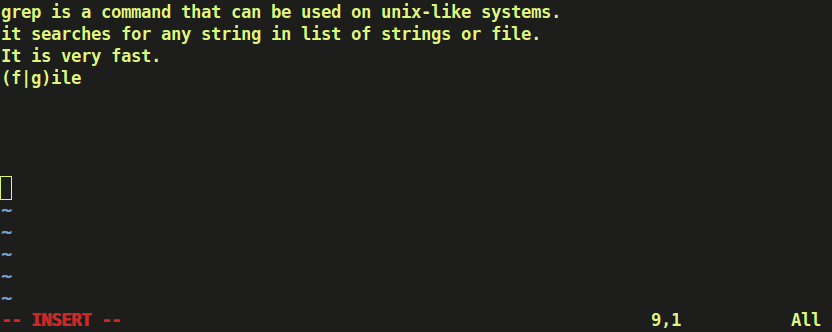

–name “*.mp3” | grep –i JayZ | grep –vi “remix” Using a find command with a couple of grep pipes will do the trick: # find. You want to find all of the *.mp3 files from the artist JayZ, but you don’t want any of the remixed tracks.
UBUNTU GREP COMMAND EXAMPLES FULL
For example, let’s say that you have an entire folder full of music files in a bunch of different formats. The grep can be very useful for filtering from stdout. Print File Content By Excluding Comments and Blank Lines DefaultRuntimeDir $ This way we only see the configuration settings in our terminal. at the end in order to hide the output of all empty lines. The –v option tells grep to invert its output, meaning that instead of printing matching lines, do the opposite and print all of the lines that don’t match the expression, in this case, the # commented lines. Wouldn’t it be easier for you, the guy helping you, and everyone reading it if you could remove all of the commented lines? Well, you can! Just run this: # grep -v ^\# /etc/apache2/nf | grep. The kind soul who replies to you has asked you to post the contents of your /etc/apache2/nf file. You are having some trouble with your Apache Web Server, and you have reached out to one of the many awesome forums on the net asking for some help. The grep can also be used to search and filter within individual files or multiple files.

Using the –i option is a good habit of getting into unless, of course, you are trying to nail down a more specific search. The –i option is there to ignore-case, as grep is case-sensitive. Second, we piped that output to grep –i python, which simply states “go to grep and filter out and return everything with ‘ python’ in it.” Ii python3-brlapi:amd64 6.0+dfsg-4ubuntu6 amd64 Braille display access via BRLTTY - Python3 bindingsįirst, we ran dpkg –l, which lists installed *.deb packages on your system. Ii python3-blinker 1.4+dfsg1-0.3ubuntu1 all fast, simple object-to-object and broadcast signaling library Ii python3-aptdaemon.gtk3widgets 1.1.1+bzr982-0ubuntu32.3 all Python 3 GTK+ 3 widgets to run an aptdaemon client Ii python3-aptdaemon 1.1.1+bzr982-0ubuntu32.3 all Python 3 modules for the server and client of aptdaemon Ii python3-apt 2.0.0ubuntu0.20.04.8 amd64 Python 3 interface to libapt-pkg Ii python3-apport 2.20.11-0ubuntu27.24 all Python 3 library for Apport crash report handling Ii python3 3.8.2-0ubuntu2 amd64 interactive high-level object-oriented language (default python3 version)

Ii python-apt-common 2.0.0ubuntu0.20.04.8 all Python interface to libapt-pkg (locales) Ii libpython3.8-stdlib:amd64 3.8.10-0ubuntu1~20.04.5 amd64 Interactive high-level object-oriented language (standard library, version 3.8) Ii libpython3.8-minimal:amd64 3.8.10-0ubuntu1~20.04.5 amd64 Minimal subset of the Python language (version 3.8) You have been scouring the web looking for tutorials, but you see that there are two different versions of Python in use, and you don’t know which version of Python is installed on Ubuntu by the installer, or if it installed any modules.įinding Files with Grep Command ii libpython3-stdlib:amd64 3.8.2-0ubuntu2 amd64 interactive high-level object-oriented language (default python3 version) Let’s say that you have just installed a fresh copy of the new Ubuntu on your machine and that you are going to give Python scripting a shot. I have found that the easiest way to get your feet wet with the grep command is to just dive right in and use some real-world examples.

UBUNTU GREP COMMAND EXAMPLES INSTALL
If for whatever reason, it is not installed on your system, you can easily install it via your package manager as shown. Grep is a powerful file pattern searcher that comes equipped on every distribution of Linux. Have you ever been confronted with the task of looking for a particular string or pattern in a file, yet have no idea where to start looking? Well then, here is grep to the rescue!


 0 kommentar(er)
0 kommentar(er)
